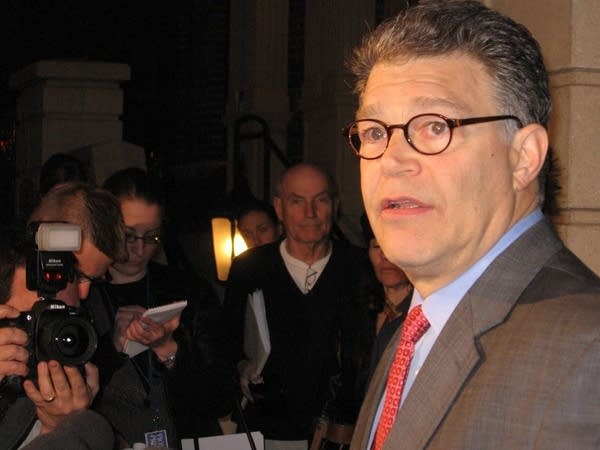Coleman appeal heads to state's highest court

Minnesota's long-running U.S. Senate battle reaches another milestone Monday.
The state Supreme Court will hear oral arguments in the election contest, which currently has Republican Norm Coleman trailing Democrat Al Franken by 312 votes. Coleman's attorneys will argue a special three-judge panel didn't adhere to the constitution in coming up with that tally.
Norm Coleman's arguments for overturning the three-judge panel's decision are laid out in the briefs filed by his attorneys. Chief among them is the notion that the panel applied too strict a standard in deciding which absentee ballots to count. The panel ended up counting about 400.
Coleman's lawyers say if the panel had used the right standard, the ballot pool would've been closer to 4,000, giving Coleman more chances to overcome Franken's lead.
Create a More Connected Minnesota
MPR News is your trusted resource for the news you need. With your support, MPR News brings accessible, courageous journalism and authentic conversation to everyone - free of paywalls and barriers. Your gift makes a difference.

Edward Foley, an election law expert at Ohio State University, says it'll be interesting to see how the state Supreme Court deals with that issue.
"It has the right to essentially say the trial court got it wrong on the law," Foley says. "And if it wants to adopt the alternative position, now I'm not saying they're going to do that, or they're even likely to do that. But if they did, that would be a game-changer because it would mean that premise of the rest of the trial is undercut."
Franken's attorneys will say the panel couldn't ignore the law; it is the Legislature that set that strict standard.
Coleman's lawyers will also argue that various counties violated the constitution's equal protection clause. This argument relies on the fact that poll workers rejected some ballots for reasons that were not considered grounds for rejection by poll workers in other counties. Franken's attorneys will argue that these amounted to "minor variations" insufficient to trigger equal protection concerns.

What is important about the case at this level is that the justices don't have to give any deference to the three-judge panel's ruling. They will be reviewing the case anew. It is the state Supreme Court that has the final say on what the law is.
The process before the Minnesota Supreme Court will be very different from Coleman's election contest trial. Instead of weeks of witness testimony, the attorneys will take turns standing at a podium and fielding questions from the justices. Coleman's side has a total of 35 minutes but is likely to argue for 25 and reserve 10 minutes of rebuttal time following Franken's 25 minutes.
Former Minnesota Supreme Court Justice James Gilbert says how the attorneys answer questions are extremely important. He says the justices will be well-versed in each side's positions, having read each side's written arguments and underlying cases.

"At oral argument that gives them a chance to ask questions that are on their mind to help get to the deep issues and give both parties a chance to respond to maybe doubts that are on their minds or clarification points they may have," Gilbert says.
After the arguments end, the justices will confer privately to discuss the merits and take a vote. When they will issue an opinion is up for speculation. They are thorough and want to get the decision right.
Rick Hasen, an election law scholar at Loyola law school in Los Angeles said once the court rules, he'll be looking for two things: who won and what relief the court ordered.
"If Coleman wins, then there will likely be an order for the lower court to do something, count more votes or something like that," says Hasen. "If Franken wins, then the lower court will be affirmed and the question of whether there will be an order regarding certification included."
Franken's attorneys have asked the Minnesota Supreme Court to order Gov. Tim Pawlenty to sign the document certifying a winner in the election. Pawlenty has hedged on whether he's obligated under Minnesota law to sign the election certificate when the court rules. He has suggested he may have the option of waiting to see whether the loser appeals to the U.S. Supreme Court or files another case in federal court.
